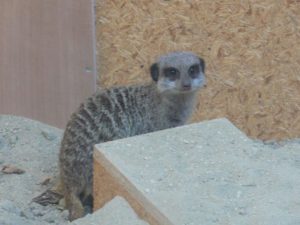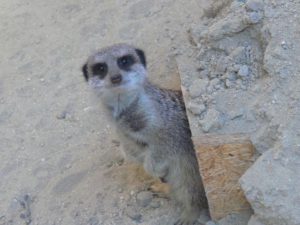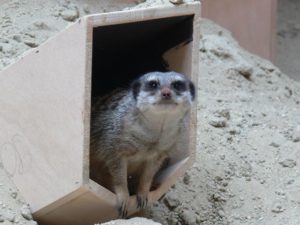The group is named the “Irchel” group (pronounced “Irkel” with a soft ch, like in Scottish Loch) – after the name of the campus the enclosure is situated in. Their group code is “ZI” (Zurich Irchel).
The following table lists the four founding individuals and their offspring born in Zurich:
Insert list here
Find more information about the group’s life history by clicking here. Short profiles of the founding meerkats are given below.
Irchel Meerkats
 Name: Mohumagadi (short: Magadi; “Queen” in Tswana language)
Name: Mohumagadi (short: Magadi; “Queen” in Tswana language)
Position in the group: ZIF001 is the dominant female.
Date of birth: 14-September-2008
History: Born in Cologne Zoo (Germany), ZIF001 was moved to Parc Zoologique et Botanique de Mulhouse (France) in July 2010, with two of her sisters (click here for a video about their arrival). Once her sister had established dominance and got pregnant, ZIF001 became the target of her aggression. The zoo agreed to give ZIF001 to the Zurich enclosure to start her own group. She arrived on February 10th, 2011. She has given birth five times, so far, but has now a hormone implant to prevent her from getting pregnant.
Notes: ZIF001 is of the northern subspecies and looks slimmer and more like the Kalahari meerkats than the males or most zoo meerkats (who are usually of the southern subspecies). She was called Bela at the Mulhouse Zoo.
 Name: Kgosi (“Chief” in Tswana language).
Name: Kgosi (“Chief” in Tswana language).
Position in group: Dominant male (while present)
Date of birth: 14-July-2007
Date of death: 03-May-2015
History: ZIM002 was born and raised in the Durrell Wildlife Conservation Trust on Jersey island, United Kingdom. He and his younger brothers ZIM003 and ZIM004 arrived in Zurich on 11th February 2011. He established male dominance of the group unchallenged, and remained dominant until his death – probably of old age – in May 2015.
Notes: ZIM002 was named Richard, in Durrell Wildlife Conservation Trust. He has a lighter face than ZIM004, and slightly greyer cheeks than ZIM003. He barks a lot, but is not as bitey as ZIM003.
 Name: Baka (“Fool”, but also “Praise” in Tswana language)
Name: Baka (“Fool”, but also “Praise” in Tswana language)
Position in group: Subordinate male
Date of birth: 13-April-2008
Moved out of the group in June 2013.
History: ZIM003 was born and raised in the Durrell Wildlife Conservation Trust on Jersey island, United Kingdom. He and his brothers ZIM002 and ZIM004, who have the same parents are from different litters, arrived in Zurich on 11th February 2011. ZIM003 acclimated well in Zurich, but soon moved to the most subordinate position among the adult males. With tension rising after two years, it was decided to remove him from the group. In June 2013 he was moved to Rapperswil Kinder Zoo‘s meerkat enclosure whose dominant male had died recently.
Notes: ZIM003’s house name at the Durrell Wildlife Conservation Trust was Dom, which is short for Dominique. He has a lighter face than ZIM004, but darker cheeks than ZIM002. He tends to bite when fed by hand. More shy than ZIM004, he went through a phase in which he often withdrew himself from the group.
 Name: Bonako (“Quick” in Tswana language)
Name: Bonako (“Quick” in Tswana language)
Position in group: Subordinate male. He is the youngest of the founding males.
Date of birth: 30-June-2008
History: Same as ZIM002 and ZIM003, ZIM004 was born and raised in the Durrell Wildlife Conservation Trust on Jersey island, United Kingdom. He and his older brothers arrived in Zurich on 11th February 2011.
Notes: ZIM004’s name at Durrell Wildlife Conservation Trust was Mark. He is best recognised, amongst the founding males, by his light brows. He is supposed to be the friendliest of the three males, and most relaxed towards humans.
In the Irchel group, he established himself as the most active and adventurous male, always exploring the surroundings.

